Key takeaways:
- The social innovation marketplace emphasizes measurable social impact rather than profit, highlighting collaboration among investors and innovators.
- Angel investments are crucial for early-stage startups addressing social issues, with a strong focus on aligning financial choices with personal values.
- Successful investments depend on understanding the startup’s mission, the team’s determination, and the scalability of the solutions.
- Building rapport with entrepreneurs through empathy and transparency fosters productive collaborations and enhances project understanding.
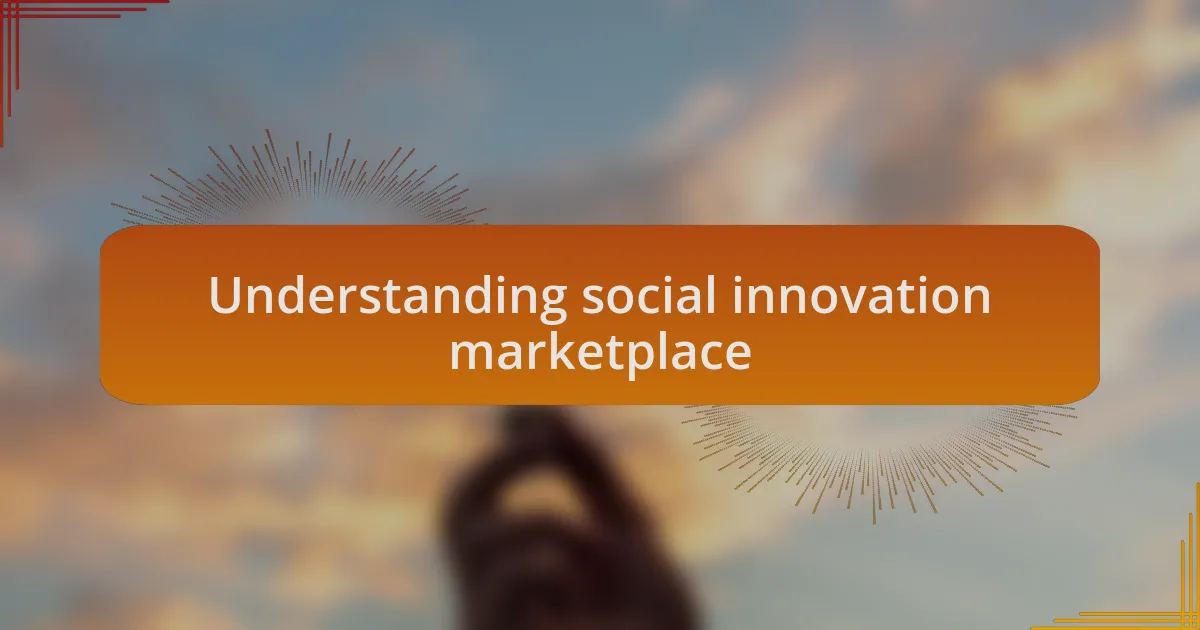
Understanding social innovation marketplace
The social innovation marketplace is a dynamic space where entrepreneurial spirit meets societal needs. I remember attending a pitch event where a startup sought funding for a project aimed at reducing food waste. It struck me how solutions in this marketplace not only address pressing issues but also create opportunities for collaboration among diverse stakeholders—like how can we as investors and innovators work together for greater impact?
What fascinates me about this marketplace is its focus on measurable social impact rather than just profit margins. I once met an entrepreneur who developed a water purification system for underprivileged communities. Hearing their story made me realize that success in this sphere isn’t just about dollars and cents; it’s about lives changed and communities improved. Isn’t it inspiring to think that every investment can potentially lead to a better world?
Engaging in this marketplace requires a keen understanding of both the challenges and the solutions it offers. I’ve found that asking the right questions—such as how sustainable a solution is or who truly benefits from it—can lead to deeper insights. Each interaction fosters an environment of learning and growth, making me wonder how we can scale these innovations for even broader impact.
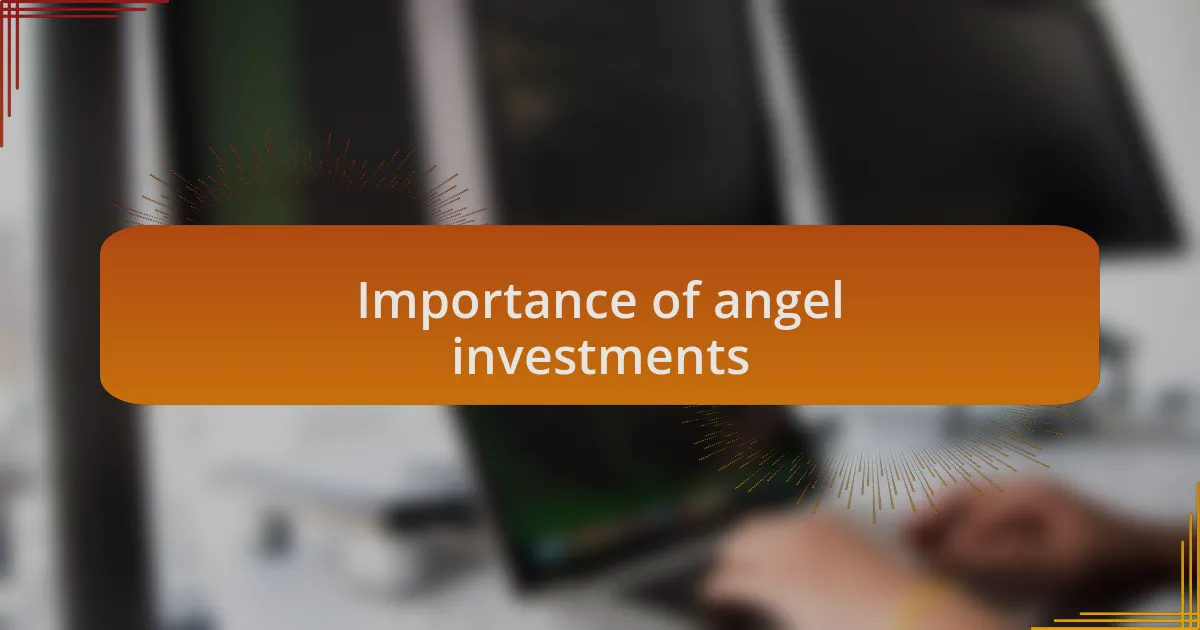
Importance of angel investments
Angel investments play a pivotal role in nurturing early-stage startups that aim to address social issues. I recall my excitement when I supported a small tech venture focusing on renewable energy; seeing their progress reinforced my belief that these investments can catalyze tangible change. Have you ever thought about how much potential lies in creative ideas just waiting for the right funding?
What really resonates with me is the risk-reward dynamic of angel investing in the social innovation space. Each investment can feel like a personal commitment to a cause I deeply care about, allowing me to align my financial choices with my values. Isn’t it empowering to know that your money can support entrepreneurs who are determined to change the world?
Moreover, angel investments can foster a culture of mentorship and collaboration. I’ve enjoyed guiding startups I’ve invested in, sharing insights from my own experiences. This two-way street of support not only helps entrepreneurs, but it also enriches my own perspective. How rewarding is it to watch someone’s vision come to life, knowing you played a part in their journey?
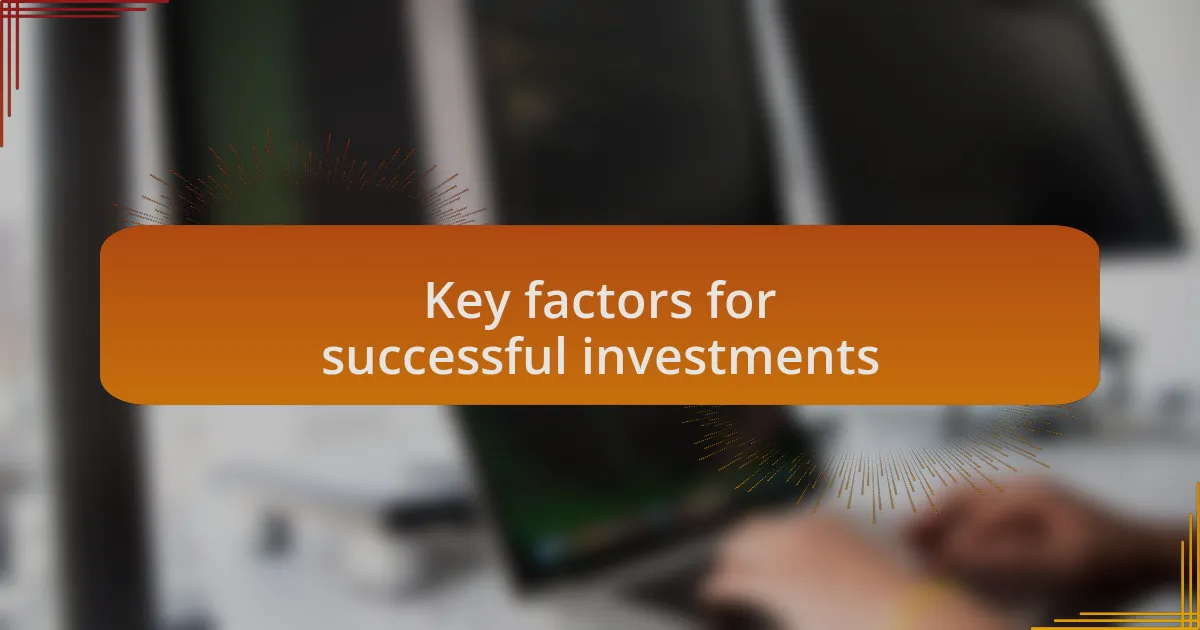
Key factors for successful investments
When considering key factors for successful investments, I find that understanding the startup’s mission is crucial. I once invested in a social enterprise dedicated to improving education access. Their clarity of purpose and passion resonated deeply with me. Do you ever feel that the strongest investments stem from aligning with a mission that speaks to your heart?
Furthermore, the team behind a startup can make or break an investment. I remember backing a group of young entrepreneurs with a solid vision but lacking experience. Their sheer determination and willingness to learn made me believe in their potential. How often do we underestimate the power of a driven team eager to adapt and grow?
Finally, scalability is essential. An amazing idea might start small, but I’m always on the lookout for ventures that can expand their impact. For instance, a local app meant to tackle food waste quickly transitioned to a nationwide platform, multiplying its positive effects. Isn’t it thrilling to invest in something that not only has the potential to grow but can also amplify its benefits for society at large?
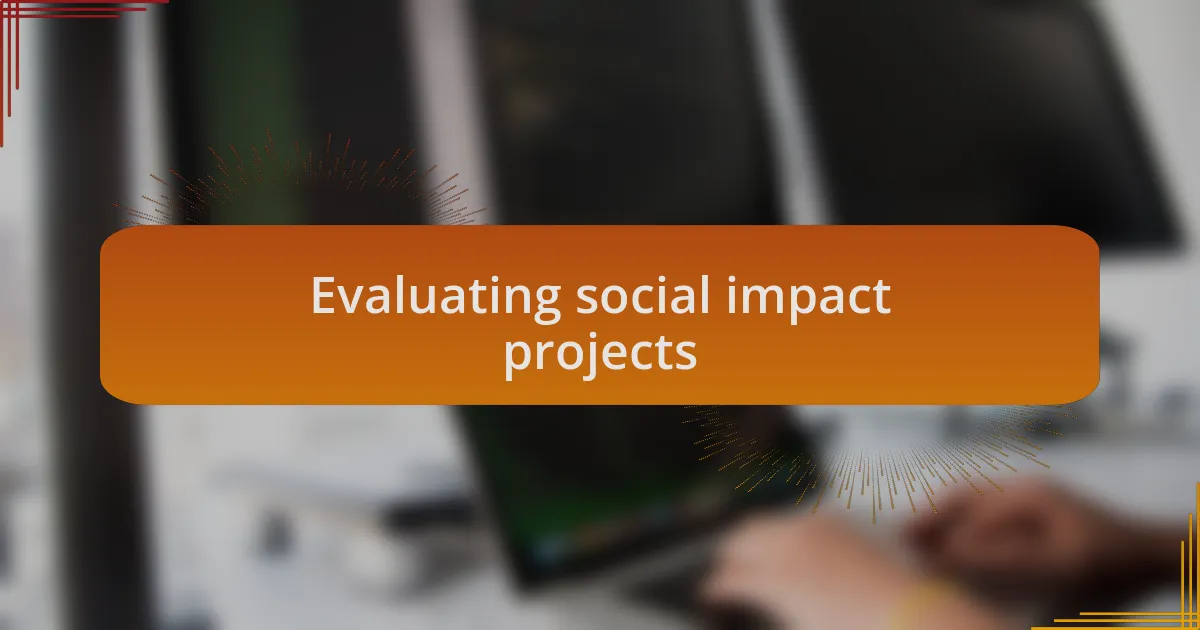
Evaluating social impact projects
Evaluating social impact projects requires a blend of quantitative metrics and qualitative insights. For instance, I once assessed a social initiative aimed at providing clean water to underserved communities. While the statistics on the number of people served were impressive, it was the heartfelt testimonials from community members that truly painted the picture of the project’s impact. Have you ever found that personal stories can convey a project’s success in ways numbers simply can’t?
I also prioritize understanding the long-term sustainability of these projects. During my evaluation of a startup focused on renewable energy, I realized that their unique business model not only addressed current climate concerns but also empowered local communities to maintain their initiatives. Reflecting on my experience, isn’t it crucial to support projects that ensure lasting change for the betterment of both people and the planet?
Moreover, engaging with stakeholders provides invaluable perspectives. I spent time with a social enterprise that provided vocational training to disadvantaged youth. Speaking with the participants directly revealed their aspirations and how the program was transforming their lives. Have you detected how such interactions can truly enrich our understanding of a project’s impact?
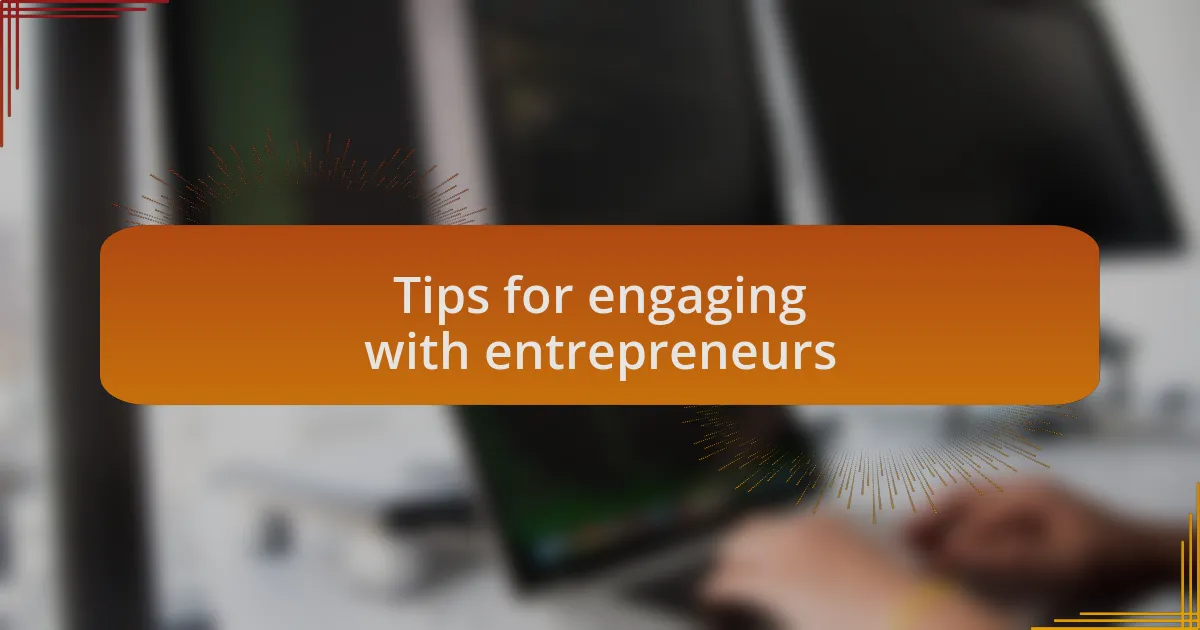
Tips for engaging with entrepreneurs
Building a strong rapport with entrepreneurs is essential for a fruitful partnership. I remember a time when I approached a startup founder over coffee instead of a formal meeting. That casual setting prompted a more open conversation, allowing us to explore not just their business model but also their passion and vision. Have you seen how informal interactions can often spark deeper insights?
Another effective strategy is actively listening to their challenges. I once worked with a social entrepreneur who faced significant obstacles in scaling their impact. By taking the time to truly understand their struggles, I was able to offer tailored advice that addressed their unique needs. Don’t you think that genuine empathy can foster stronger, more productive collaborations?
Transparency is key when engaging with entrepreneurs. In my experience, I’ve found that clearly sharing expectations and potential pitfalls can prevent misunderstandings down the line. I once laid out both the benefits and the risks of a potential investment with a founder, which led to an honest dialogue about the path forward. How do you approach the delicate balance of transparency and optimism in such conversations?
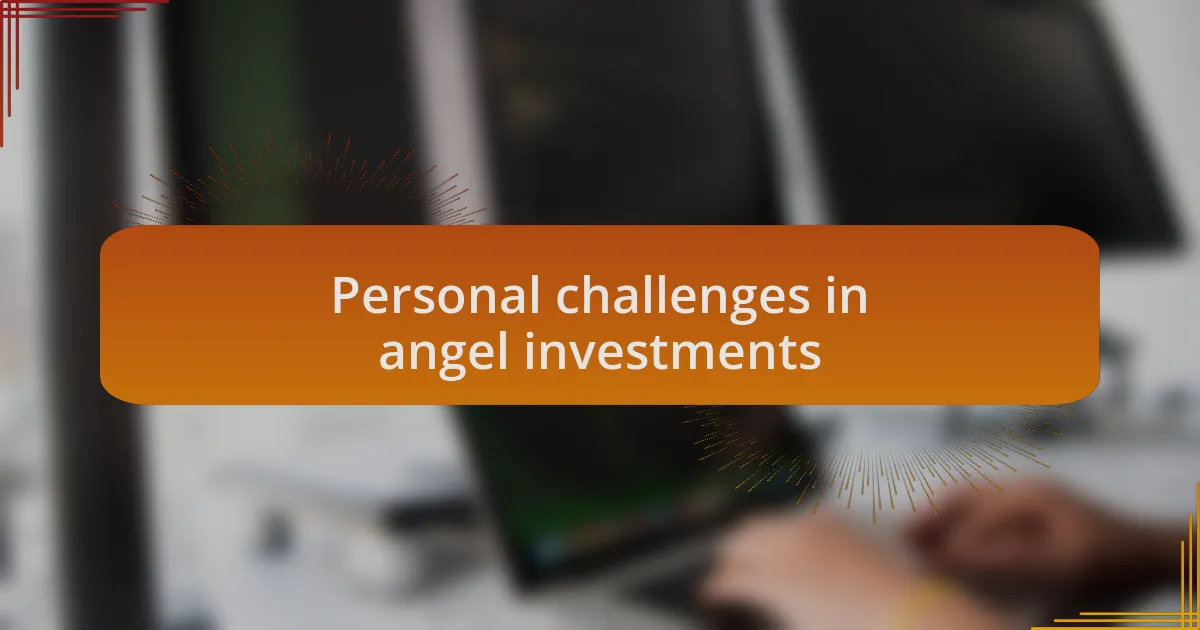
Personal challenges in angel investments
When I first ventured into angel investments, I underestimated the emotional toll of uncertainty. There were days when doubt crept in, especially when a startup faced setbacks. I recall one particular investment where the founder hit a critical snag, and I found myself questioning the decision I made—did I really analyze the risks thoroughly enough?
Another challenge I faced was balancing my desire for a strong return with the need to support meaningful innovation. Investing in socially impactful startups can sometimes feel like a tug-of-war between idealism and practicality. I remember passing on a brilliant social venture because its financial projections seemed too ambitious. In hindsight, I often wonder if that was a misstep—did I prioritize caution over potential?
Lastly, I realized that fostering a sense of community is vital but often demanding. Connecting with fellow angel investors can provide valuable insights, but it also requires significant time and effort. I found myself attending countless networking events, sometimes feeling like I was on autopilot. Have you experienced that nagging sense of fatigue while trying to build connections that matter? Balancing these relationships with my commitments at home has certainly tested my resilience.
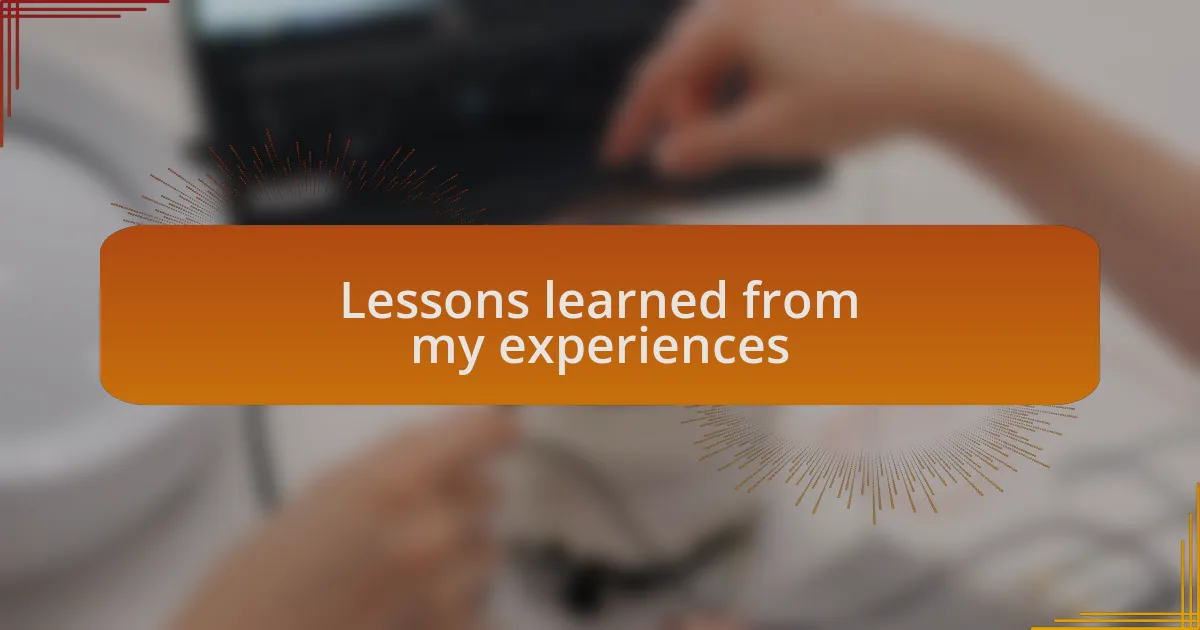
Lessons learned from my experiences
When reflecting on my journey in angel investments, one lesson stands out: the importance of patience. Early on, I was eager to see quick results and often found myself frustrated when a startup didn’t deliver as promised. I vividly remember investing in a tech company, anticipating rapid growth. However, it took over a year for them to pivot successfully, teaching me that sometimes, the best outcomes take time and persistence.
Another significant lesson was the power of gut instinct. I once hesitated to invest in a passionate founder because the market analysis was less than stellar. Yet, my intuition told me there was something special about their vision. Ultimately, that startup became a leader in its niche, reinforcing my belief that experience and instincts often guide better decisions than data alone. Have you ever ignored that inner voice only to regret it later?
Lastly, I’ve learned the value of surrounding myself with diverse perspectives. My most fruitful investment conversations often come from unexpected sources—like a mentor from a completely different industry. I recall sitting down with a friend who was a chef, and his insights on sustainable practices led me to rethink a potential investment in a food tech startup. His fresh viewpoint illuminated possibilities I had overlooked, proving that collaboration can spark innovative ideas. Have you tapped into your network in surprising ways?